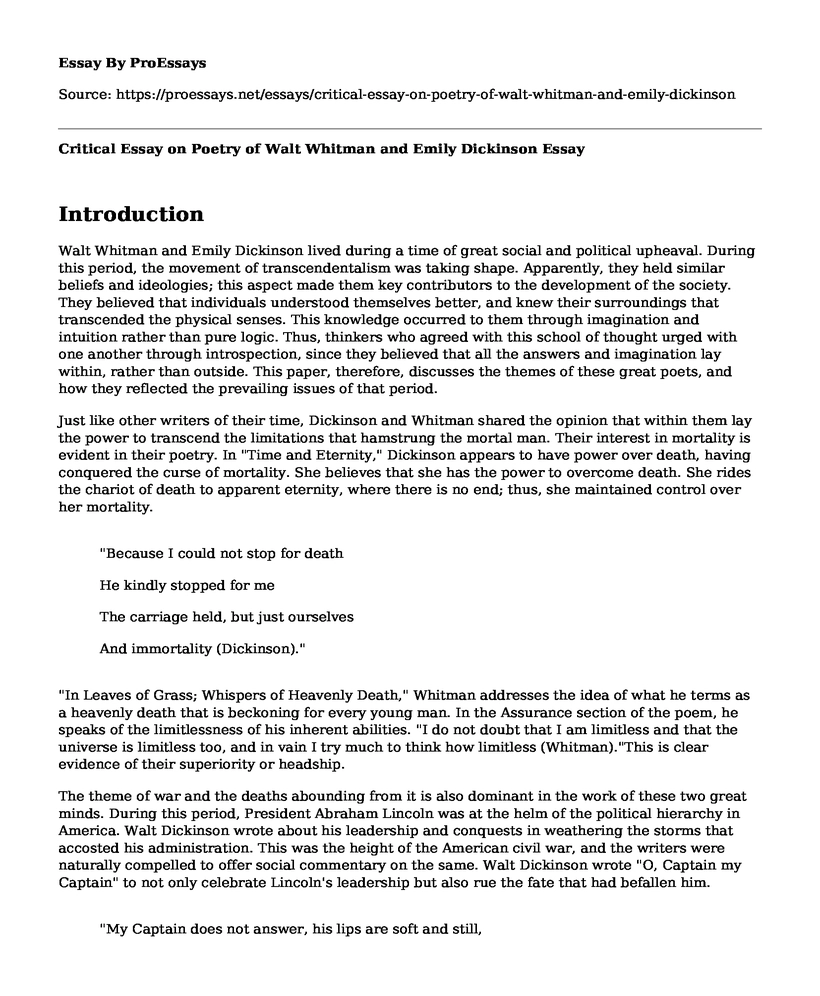Introduction
Walt Whitman and Emily Dickinson lived during a time of great social and political upheaval. During this period, the movement of transcendentalism was taking shape. Apparently, they held similar beliefs and ideologies; this aspect made them key contributors to the development of the society. They believed that individuals understood themselves better, and knew their surroundings that transcended the physical senses. This knowledge occurred to them through imagination and intuition rather than pure logic. Thus, thinkers who agreed with this school of thought urged with one another through introspection, since they believed that all the answers and imagination lay within, rather than outside. This paper, therefore, discusses the themes of these great poets, and how they reflected the prevailing issues of that period.
Just like other writers of their time, Dickinson and Whitman shared the opinion that within them lay the power to transcend the limitations that hamstrung the mortal man. Their interest in mortality is evident in their poetry. In "Time and Eternity," Dickinson appears to have power over death, having conquered the curse of mortality. She believes that she has the power to overcome death. She rides the chariot of death to apparent eternity, where there is no end; thus, she maintained control over her mortality.
"Because I could not stop for death
He kindly stopped for me
The carriage held, but just ourselves
And immortality (Dickinson)."
"In Leaves of Grass; Whispers of Heavenly Death," Whitman addresses the idea of what he terms as a heavenly death that is beckoning for every young man. In the Assurance section of the poem, he speaks of the limitlessness of his inherent abilities. "I do not doubt that I am limitless and that the universe is limitless too, and in vain I try much to think how limitless (Whitman)."This is clear evidence of their superiority or headship.
The theme of war and the deaths abounding from it is also dominant in the work of these two great minds. During this period, President Abraham Lincoln was at the helm of the political hierarchy in America. Walt Dickinson wrote about his leadership and conquests in weathering the storms that accosted his administration. This was the height of the American civil war, and the writers were naturally compelled to offer social commentary on the same. Walt Dickinson wrote "O, Captain my Captain" to not only celebrate Lincoln's leadership but also rue the fate that had befallen him.
"My Captain does not answer, his lips are soft and still,
My father does not feel my hand, he has no pulse nor will,
From fearful trip, the victor ship comes in with object won (Whitman)."
Similarly, Emily Dickinson also offered social commentary on the raging war that had devastated the land. She wrote of the celebrations of winning the battles that were stopped short by the dawning of the reality of fatalities. She is so deeply affected by the plight of the dead that she is unable to find glory in the triumph secured by their sacrifice.
"Conclusion turned on me
And then I hated glory
And wished myself were they (Dickinson)."
Conclusion
It is clear that Emily Dickinson and Walt Whitman made significant contributions to the age of transcendentalism. Traces of this belief system are evident in their works that exalt the individuality of either the personas in their poems or their heroes. However, the casualties of war also challenged their notion of idealistic limitlessness inherent in all individuals, as highlighted in their writings.
Works Cited
Emily, Dickinson. "27. Because I Could Not Stop for Death. Part Four: Time and Eternity. Dickinson, Emily. 1924. Complete Poems." Bartleby.com. http://www.bartleby.com/113/4027.html. Accessed on 25 Mar. 2018.
Whitman, Walt. "Poetry of Walt Whitman; Full-Text Poems of Walt Whitman, Including Leaves of Grass, At Everypoet.Com." Everypoet.com. http://www.everypoet.com/Archive/poetry/Walt_Whitman/walt_whitman_leaves_of_grass_book_30.htm. Accessed on 25 Mar. 2018.
Cite this page
Critical Essay on Poetry of Walt Whitman and Emily Dickinson. (2022, Apr 12). Retrieved from https://proessays.net/essays/critical-essay-on-poetry-of-walt-whitman-and-emily-dickinson
If you are the original author of this essay and no longer wish to have it published on the ProEssays website, please click below to request its removal:
- Annotated Bibliography on American Dream and Identity Issues
- Power Struggles in The Tempest Essay
- Critical Essay on Themes Within The Great Gatsby
- To Kill a Mockingbird by Harper Lee: Citical Essay Sample
- Singapore - Literary Analysis Essay
- Essay Sample on Chun-Hyang: Kisaengs of Goryeo - A Tale of a Female Character
- Gods in the Ancient World - Essay Example







